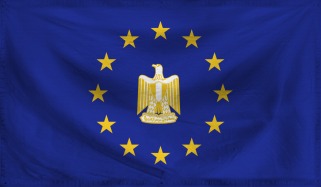
The Western Front has been bombed, shelled, and gassed to the stone age, devolving into an anarchic wasteland full of roving gangs and survivalist groups who cower in fear as Entente and Central Power bombers fly daily over their heads to keep No Man's Land barely habitual, and their enemies' infrastructure back home in constant disrepair.
The Russian Civil War has brought the country into multiple warring factions fighting endlessly for control over a husk of a former empire. The Stock Market Crash of 1925 has never been fully recovered, crippling the American Dream into becoming a living Jim Crow fashioned nightmare. Vorbeck's Brigades continues to wreak havoc in Sub-Saharan Africa into the modern day, turning the colonies back to their more tribalistic beginnings as authority from their European masters have broken down.
Hitler's NSDAP, Strasser's Freikorps, and the Spartacus League conspire to bring down Kaiser Wilhelm II's empire from within, as Germany's military industrial complex has finally reached the apex of rotting German society from within with civil war looming on the horizon. France and Great Britain as well deal with their own infighting and uprisings domestically, bringing tensions within the Entente to a boiling point of no return.
The world stands at the abyss, and the abyss is staring right back at it...
Note, with the Map.
- -Blacken areas represent places with no authority and are anarchic in nature. Largely either run by warlords or isolated communities or tribes. You can apply to be such a group yourself, but be warned it will be a dog eat dog world.
-No Authority can also be gradually retaken and claimed by more functioning states over the course of the IC through a bit of effort on the players part. Their challenge is less military conquest, and more establishing the peace and integration over time.
Note, when making an application: Take into account that GDP and Population size for a majority of countries would've taken a big hit compared to their OTL numbers with WW1 prolonging itself into 1936 and with Spanish Influenza being rampant.
Many nations, especially those that have participated in the heavy fighting of the Great War, have become very unstable politically and sociably, and as such many political groups, even obscured ones from OTL, have been vying for power to bring their countries from becoming borderline failed states. So take this into account depending on the country you choose to play as, especially when filling out the National Debuffs in the application. These represent the more negative characteristics and spirits your country is facing by 1936, these can however be overcome and mitigated through time and effort put forth into improving your country over the course of the IC. It is recommended you pick two or three of these Debuffs.
Also if applying for a political or paramilitary group to a country, also specify location of states where the political base is most strongest.
- Code: Select all
[b]Country/Political Group/Anarchic State(Full Name):[/b]
[b]Head of State/Leader:[/b]
[b]Location:[/b]
[b]Government Type:[/b]
[b]Capital:[/b]
[b]National Debuffs (Pick Two or Three):[/b]
[b]GDP:[/b]
[b]Population:[/b]
[b]History:[/b]
[b]Map Color:[/b]
-Do Not Remove 88-
OP: Wasi State
Co-Ops: Plzen








